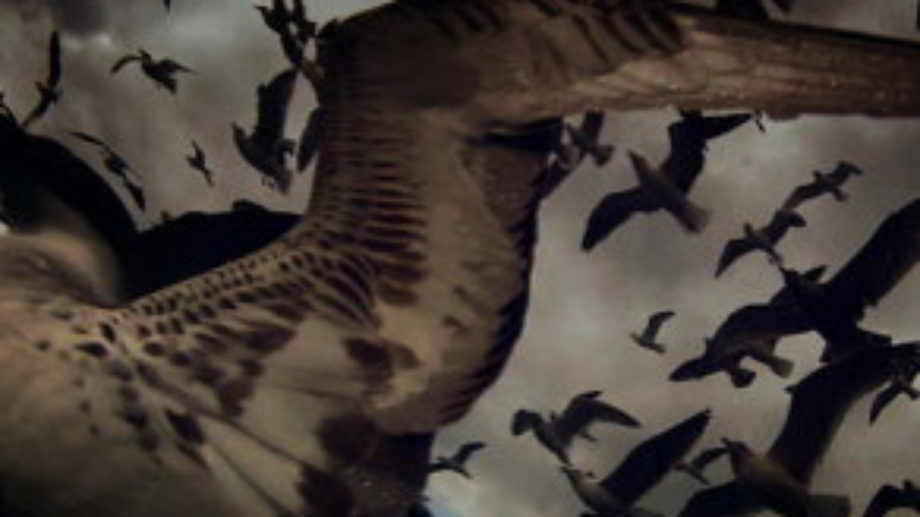
An ultra-verité documentary about fishermen drawing on the combined talents of the Harvard anthropolgists/filmmakers behind Foreign Parts (Véréna Paravel) and Sweetgrass (Lucien Castaing-Taylor), Leviathan is not only the most highly anticipated entry in Locarno this year but, at this late stage in the festival, also the best. If, as a general rule, it's best not to get overly excited about a movie sight unseen, consider this an exception: the kind of film that creates an environment so visually and aurally complete as to be nearly indescribable. There's close to zero dialogue, nor is there any narration; the only context Paravel and Castaing-Taylor provide is a title-explaining epigraph from Job 41 – It makes the depths churn like a boiling caldron / and stirs up the sea like a pot of ointment – and a note in the end credits about New Bedford, Massachussets-based seafarers who have been lost at sea.
Even without these passing nods toward its larger implications, though, the film is such an overwhelming sensory experience that such clues are hardly necessary. Shot on over a dozen different cameras (some of them destroyed by the unforgiving waves, others passed between filmmaker and fisherman alike), Leviathan's dark aesthetic is both dense and fluid, free-wheeling and churning. At several points, the camera is dropped underwater in a way that surely resembles drowning – muffled noises, dimming vision – while other sequences are presented as one continuous shot spanning long periods of time and any number of locations both on- and offboard. The results are so jarringly first-person and experiential that they resemble a sort of art-house/experimental corollary to Star Tours, at times verging on nonfiction horror.
The fishermen themselves exist largely at the fray, part of a larger canvas rather than its focus. This seems to suit them just fine: with blood and gore speckling their faces like blemishes, they're both aware of and indifferent to the cameras filming them as they go about their work. Paravel and Castaing-Taylor observe the men silently, unobstrusively; where a lesser, more on-the-nose documentary would go out of its way to paint their painstaking work as a sob story of the noblest kind, Leviathan works as a semi-closed system that lets us draw connections as we will. It's hugely absorbing, but rarely in a way that disallows our own pondering. Still, it's clear enough that these men's livelihoods rest entirely on the innumerable fish we see caught and reduced to spare parts, parts that are quickly, greedily devoured by the scavenging gulls who can almost always be seen hovering above the boat like vultures. And then, moments later, the camera moves again and we're brought ten or more feet beneath the surface, which the chum has made into both a feeding ground and a tomb. This is its own constained ecosystem, and it's a savage one.
“Take the first one and go all the way to the end. All the way to the top.” This line, spoken several minutes in, is the first semi-discernible bit of dialogue in Leviathan; it's also one of the last. There's no heart-wrenching phone call made from atop a mountain as there was in Sweetgrass, only a minutes-long scene of one man falling asleep sitting up while watching a movie. The lack of dialogue or voiceover is far from a problem. To emerge from the waves and look upon a massive flock of seagulls swarming under a black, moonless sky and just as quickly be submerged once more is to be wordlessly reminded of what film – and quite possibly only film – can achieve.

Elsewhere in the international competition, two pleasant and humanistic surprises: Jem Cohen's Museum Hours and Sean Baker's Starlet. Though a consensus has yet to form on the quietly affecting Museum Hours, which takes place largely in Vienna's Kunsthistorisches Museum, the San Fernando Valley-set Starlet has emerged as a favorite among many. This isn't especially surprising: Baker handles oft-sensationalized subject matter with an exceptionally soft, measured touch; what's more, model-turned-actress Dree Hemingway gives the festival's breakout performance. That an American independent which debuted at SXSW has managed to become one of the most talked-about and warmly-received films in a tucked-away festival in Switzerland speaks to how well Locarno balances its slant toward the avant-garde with inclusivity, a feat other festivals might do well to emulate.
Both films tell of chance encounters leading to strange friendships; also shared between them is a certain stillness, a slow-burning momentum that becomes more and more engrossing as disparate narrative developments gradually converge. Where Leviathan's immediacy demands attention, these two humbly invite it via diverse, sympathetic figures who come together in genuinely unexpected and moving ways, forging something new out of familiar parts.
Michael Nordine lives in Los Angeles and has also written for Filmmaker Magazine, LA Weekly, and the Village Voice.
More dispatches from the Critics Academy participants will be published on FilmLinc.com through the end of the Locarno Film Festival on August 11. Keep watching for their bylines in the coming days!



